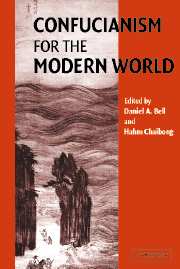Book contents
- Frontmatter
- Contents
- List of Contributing Authors
- Acknowledgments
- Editors' Note
- Introduction: The Contemporary Relevance of Confucianism
- PART I CONFUCIAN PERSPECTIVES ON DEMOCRACY
- 1 Constitutionalism, Confucian Civic Virtue, and Ritual Propriety
- 2 The Challenge of Accountability: Implications of the Censorate
- 3 Confucian Democrats in Chinese History
- 4 Mutual Help and Democracy in Korea
- 5 A Pragmatist Understanding of Confucian Democracy
- 6 The Case for Moral Education
- PART II CONFUCIAN PERSPECTIVES ON CAPITALISM
- PART III CONFUCIAN PERSPECTIVES ON LAW
- Epilogue: Why Confucius Now?
- Index
1 - Constitutionalism, Confucian Civic Virtue, and Ritual Propriety
Published online by Cambridge University Press: 28 August 2009
- Frontmatter
- Contents
- List of Contributing Authors
- Acknowledgments
- Editors' Note
- Introduction: The Contemporary Relevance of Confucianism
- PART I CONFUCIAN PERSPECTIVES ON DEMOCRACY
- 1 Constitutionalism, Confucian Civic Virtue, and Ritual Propriety
- 2 The Challenge of Accountability: Implications of the Censorate
- 3 Confucian Democrats in Chinese History
- 4 Mutual Help and Democracy in Korea
- 5 A Pragmatist Understanding of Confucian Democracy
- 6 The Case for Moral Education
- PART II CONFUCIAN PERSPECTIVES ON CAPITALISM
- PART III CONFUCIAN PERSPECTIVES ON LAW
- Epilogue: Why Confucius Now?
- Index
Summary
CONSTITUTIONALISM AND THE IMPORTANCE OF CIVIC VIRTUE
These days, we are apt to combine the two terms “democracy” and “constitutionalism” and talk about “constitutional democracy,” without giving much thought to the nature of the relationship or connection between the two. If we do think about it, however, we will find that there is something of a tension between the two. For democracy usually refers to a form of politics in which the people are the source of power and legitimacy, and it is thus associated with the idea of majority rule. Of course, this is not the whole story, and there may certainly be other, more sophisticated conceptions of democracy. Yet, by and large, it is intimately associated with the ideas of self-rule and selfdetermination through various forms of participation in the political process.
Constitutionalism, on the other hand, refers to the notion of regulating and restraining the political process and government power according to some higher norm that cannot be changed even if the majority wants to change it. It is grounded in the idea that there are some things that are so important that they should be protected against the majority will, which is bound to be always changing and may even be fickle. Of course, in a democratic polity, constitutions can always be amended or revised by the people.
- Type
- Chapter
- Information
- Confucianism for the Modern World , pp. 31 - 53Publisher: Cambridge University PressPrint publication year: 2003
- 5
- Cited by



